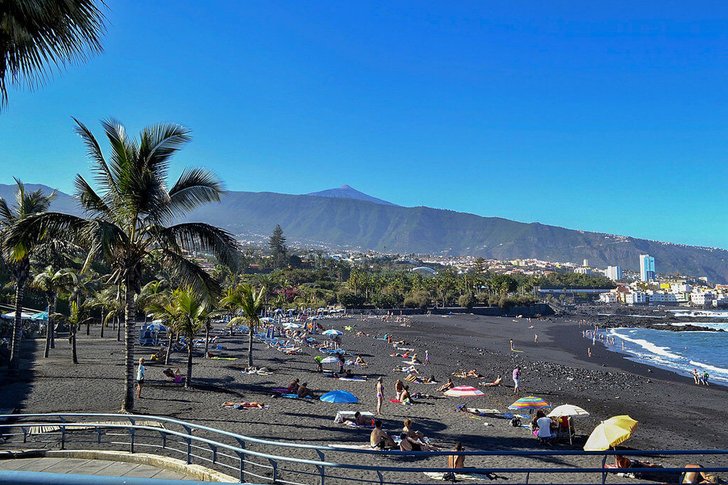Spain is a traveler's paradise. This is a country with an ancient history, with many well-preserved medieval quarters and squares. The magnificent architecture of Antonio Gaudi and kilometers of luxurious beaches of the Atlantic coast and the Mediterranean. Spain is also rich in natural attractions, the Sierra de Tramontana and Garajonay Park are protected by UNESCO. In total, there are 48 sites in the country (2019) included in the World Heritage List.
What to see and where to go in Spain?
The most interesting and beautiful places, photos and a brief description.
- Sagrada Familia
- Casa Batlló and Casa Mila
- Gothic Quarter (Barcelona)
- Plaza de España (Seville)
- Park Guell (Barcelona)
- Las Ramblas (Barcelona)
- National Prado Museum (Madrid)
- Royal Palace (Madrid)
- City of Arts and Sciences (Valencia)
- Guggenheim Museum Bilbao
- Reina Sofia Art Center (Madrid)
- Palace of Catalan Music (Barcelona)
- Seville Alcazar
- Alcazar of Segovia
- Alhambra (Granada)
- Alcazar of Toledo
- Burgos Cathedral
- Seville Cathedral
- Mesquita (Cordoba)
- Escorial Monastery
- Nuestra Senora del Pilar (Zaragoza)
- Cathedral of Saint James (Santiago de Compostela)
- City of Cuenca
- Aqueduct in Segovia
- Roman theater (Merida)
- Tower of Hercules (A Coruña)
- Biscay Bridge (Portugalete)
- Puente Nuevo (Ronda)
- Cave of Altamira
- Teide National Park
- Garajonay National Park
- Sierra de Tramontana
- Dunes of Maspalomas
- La Concha beach (San Sebastian)
- Loro park
- Costa Brava
- Ibiza island
- Canary Islands
Sagrada Familia
This is the most famous building of the great Antonio Gaudi. Also known as the Sagrada Familia. It is noteworthy that the construction of the temple, begun in 1882, has not been completed to this day. The grandiose building is a symbol of all of Barcelona and Catalonia. The majestic and imposing building began to be built in the Gothic style, but Gaudí introduced the originality of Art Nouveau into its appearance, adding lightness and delicacy to the temple.
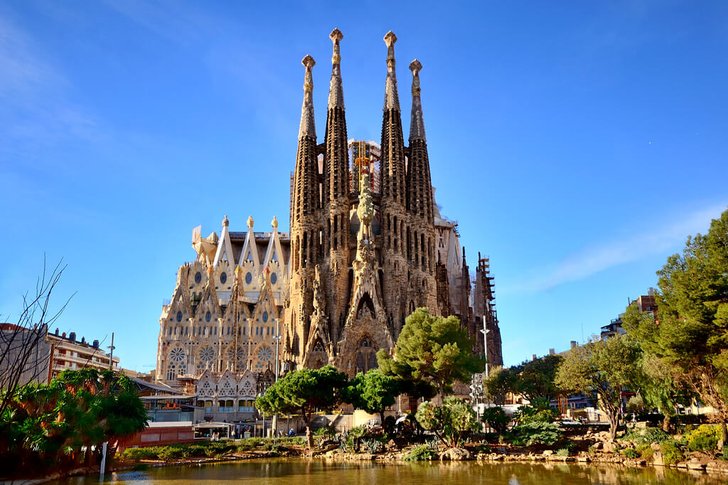
Casa Batlló and Casa Mila
Mila House is a monument of architecture and a residential building, which is included in the UNESCO heritage list. The house with an extravagant façade was designed by Antonio Gaudí. Part of the facade are wrought-iron lattices of balconies of an unusual shape. The building now houses the Gaudí Museum. An unusual facade is interesting for another creation of Gaudí - Casa Batllo. The facade is called "dancing" because of the curved lines in its design.
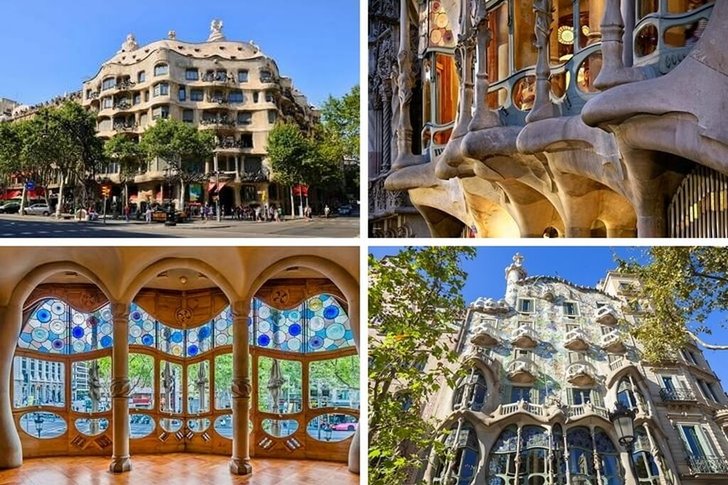
Gothic Quarter (Barcelona)
In the labyrinth of narrow streets of the quarter, many old buildings from the Middle Ages and the Roman Empire have been preserved. In the chaotic layout of the quarter, it is easy to get lost or get into a dead end, but this does not bother tourists from all over the world who come here to appreciate the beauty of historical architecture. In this incredibly beautiful place, Gothic harmoniously combines with the Renaissance and neoclassic.
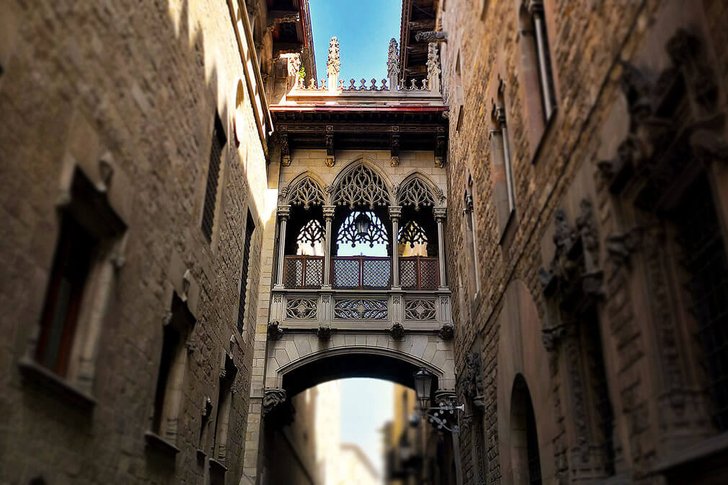
Plaza de España (Seville)
The semicircular square is located in Seville near Maria Luisa Park and is one of the brightest in Europe. It is separated by a channel through which graceful bridges are thrown. The area is surrounded by an architectural ensemble of buildings in the neo-Moorish style. A large fountain decorates the center of the square. The pavilion on the edge of the square often hosts interesting exhibitions, and its design features art deco features.
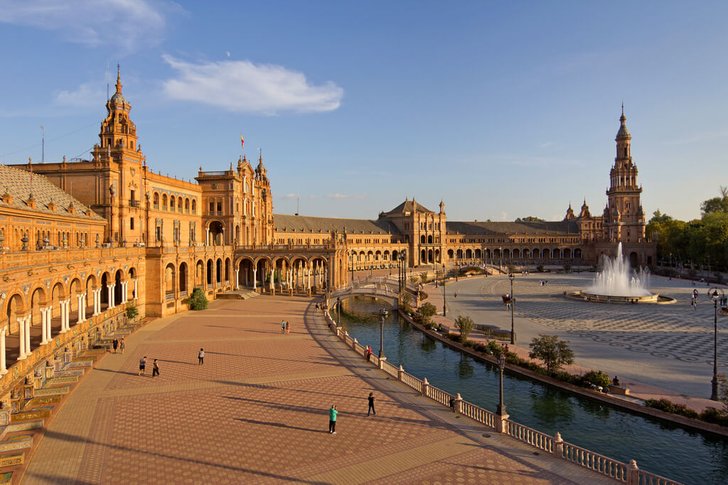
Park Guell (Barcelona)
Located on the outskirts of Barcelona. Its construction began in 1901. Antoni Gaudí also designed the park. The park's most famous attraction is a huge, winding bench made from pottery shards, broken glass, and other colorful construction debris. The park is also decorated with other intricate compositions - fabulous houses at the entrance to the park, a mosaic Salamander and the "Hall of 100 Columns".
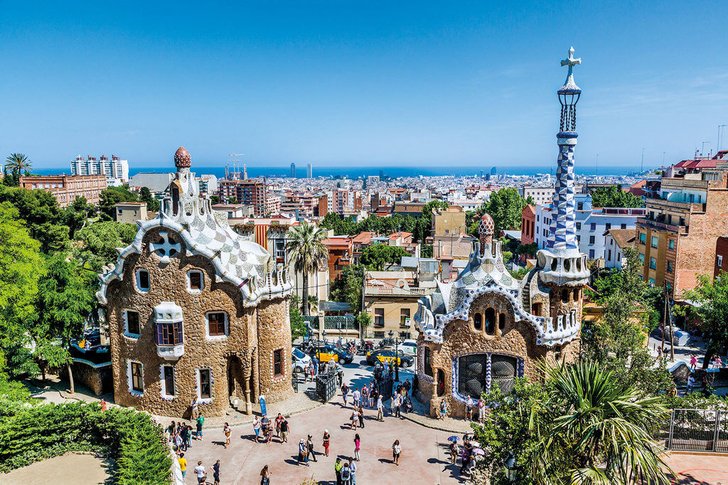
Las Ramblas (Barcelona)
Pedestrian street with a length of just over a kilometer. It has a special soulful atmosphere of real Spain. The colorful Pla del Os with a Joan Miro mosaic on the sidewalk, the Boqueria market, the Canaletes fountain with drinking water, churches, palaces and monuments - the street is full of many attractions. For the Olympic Games in 1992, the modern Sea Boulevard was added to the street.
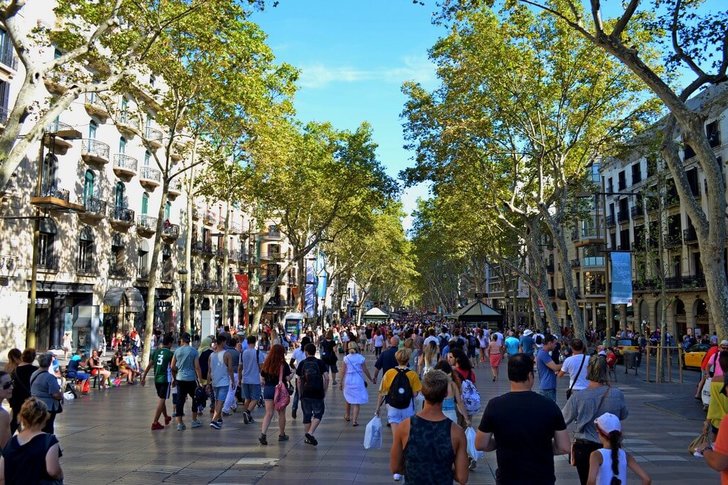
National Prado Museum (Madrid)
Opened in 1819 in Madrid. It is located in a building of magnificent architecture in the style of classicism. The museum has one of the best collections of paintings in Europe. The funds contain about 7,000 paintings. The canvases of artists from different countries are presented - Flemish, English, German, Spanish. A number of exhibitions are devoted to other types of art - about 1000 sculptures and almost 5000 engravings. There are halls with arts and crafts and decorations.
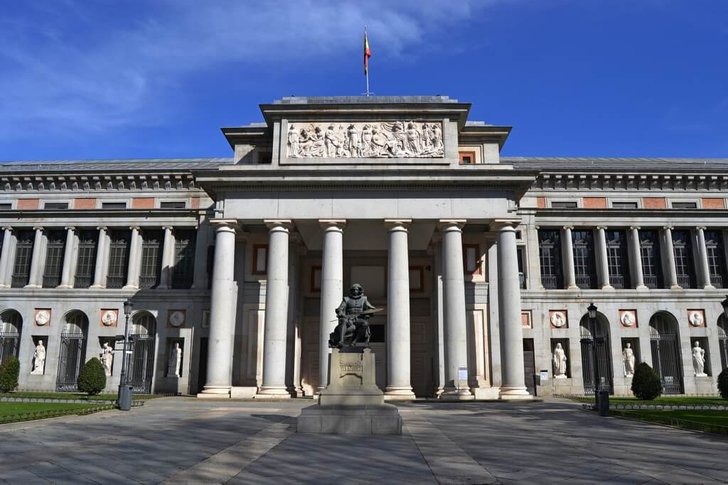
Royal Palace (Madrid)
Despite the fact that the palace is officially the residence of the kings of Spain, it is open to tourists. You can see 50 rooms out of 2000. Visitors will not be indifferent to the interior of the halls and rooms. Marble, mahogany, stucco are used in their decoration. Several frescoes were painted by Caravaggio and Rubens. Unique collections have been collected - from weapons and armor to Stradivari instruments.
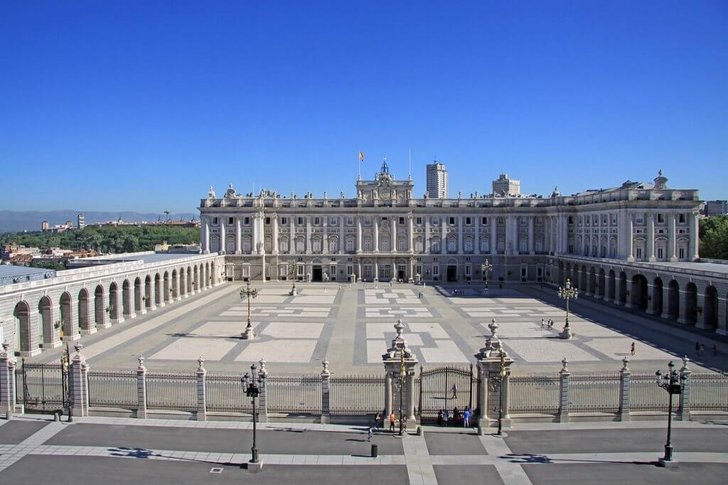
City of Arts and Sciences (Valencia)
An architectural complex of five structures for various purposes in the city of Valencia. Modern buildings house a cinema, a planetarium, a theater, a greenhouse, a science museum, a concert hall, and an open-air oceanographic park. The grandiose suspension bridge completes the composition. Its length is 180 meters, and the height of the mast is 125 meters. On the territory around the complex there is a beautiful park with streams and pools.
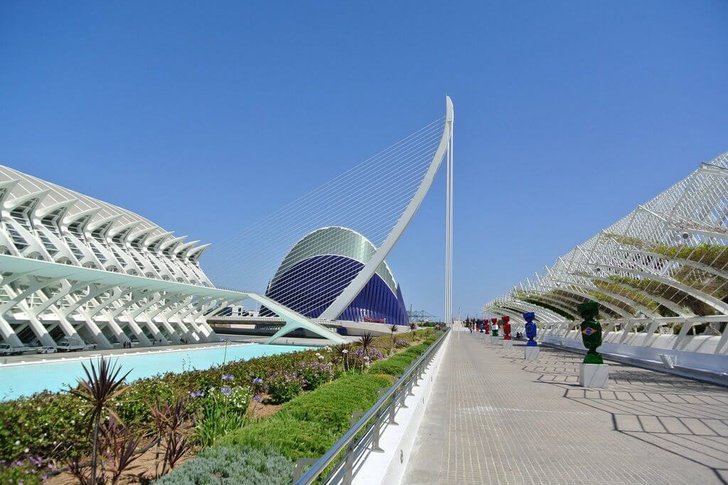
Guggenheim Museum Bilbao
Museum of Contemporary Art in Bilbao. It houses exhibitions of both local and foreign artists. The main theme of the work is the avant-garde. There are more installations and electronic works in the museum than traditional paintings and sculptures. There are works by Gerhard Richter and Andy Warhol. The futuristic building of the museum on the banks of the Nervion River, with its abstract form, evokes many associations among visitors - a spaceship, an airplane or a rosebud.
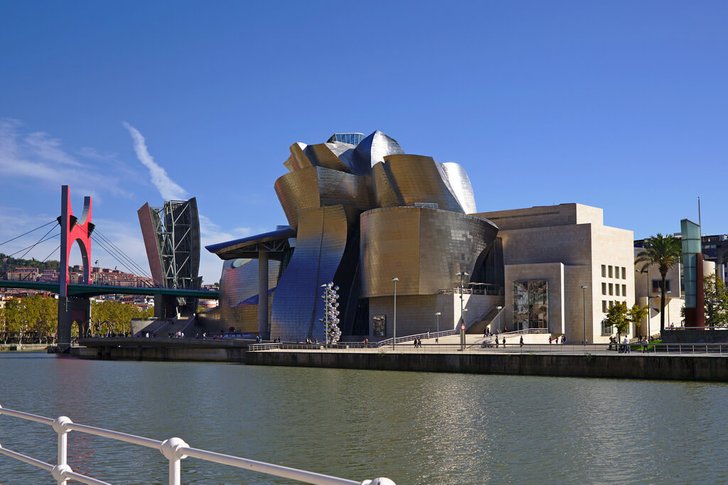
Reina Sofia Art Center (Madrid)
A museum that houses modern art paintings and about 40,000 books. Most of the collections of paintings are the works of Spanish surrealists and avant-garde artists from the 20th century to the present. The pearl of the art center is the painting by Pablo Picasso "Guernica". One of the directions of the Center's work is research activity. Lectures on art history are given to students.
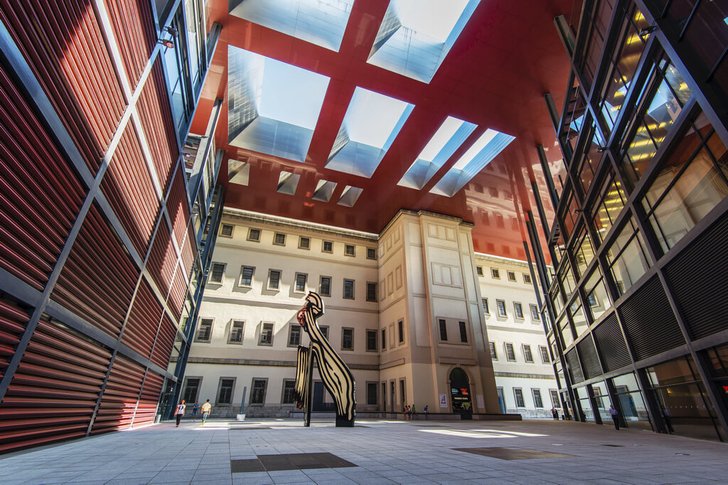
Palace of Catalan Music (Barcelona)
Concert hall in modern style. A feature of its architecture is the natural lighting of the hall. The glass ceiling made of colorful mosaics looks like a dome. The combination of blue and gold colors prevails, which resembles a real sky with the sun. The facade is decorated with frescoes. Inside the hall there are many sculptures - Valkyries from Wagner's opera and Greek muses. The palace hosts world-class performances.

Seville Alcazar
Built on the site of the ruins of an Arab fortress. The construction of the palace began in the 14th century. This is one of the few well-preserved Mudéjar palaces. For a long time the palace was the residence of the Spanish kings. The elegance and luxury of the interior design can best be appreciated in the Palace's Embassy Hall and in the room of Charles V. Stucco work and decorative compositions are presented in the Maiden's Patio.
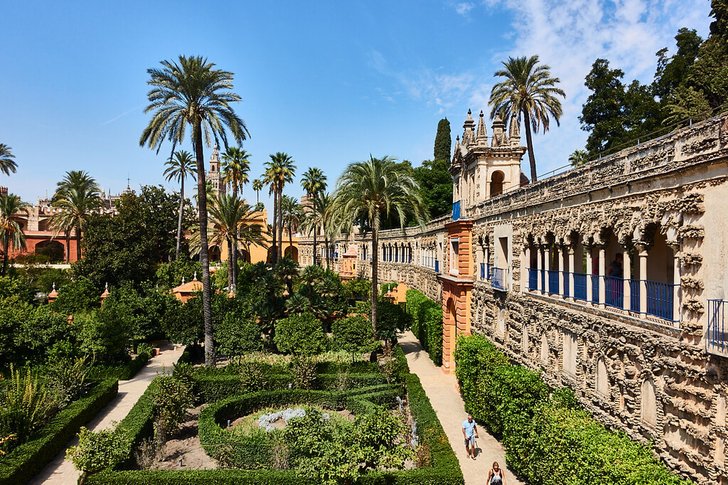
Alcazar of Segovia
One of the most popular places in Spain. Located on a high cliff at the confluence of small rivers. The building was erected in the 9th century as a fortress, later it was rebuilt into a palace. Now the palace houses a museum. Ancient interiors have been recreated, collections of weapons, furniture and portraits of kings are on display. The throne room, the stone hall and the hall with Venetian stained-glass windows are especially popular with tourists.
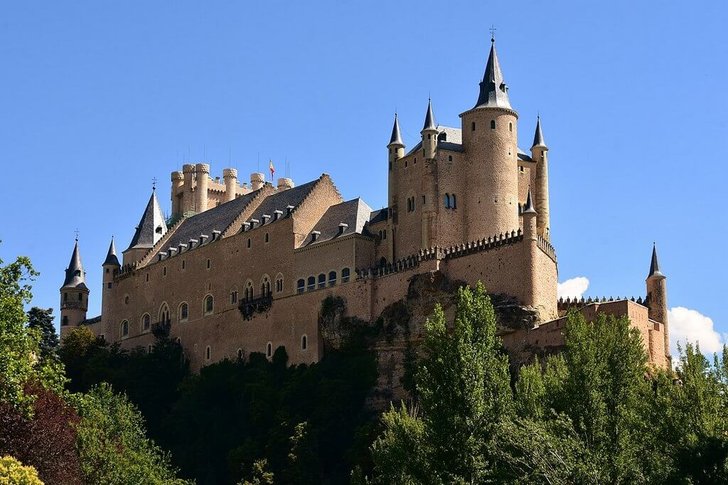
Alhambra (Granada)
A grandiose architectural ensemble in Granada, the main buildings were erected in the XII-XV centuries during the reign of the Muslim dynasty. Behind the fortress walls are mosques, baths, residential buildings. Beautiful gardens are in harmony with the buildings of Islamic architecture. Among the cypresses and orange trees there are several small ponds and fountains. Bubbling water creates a special mood.
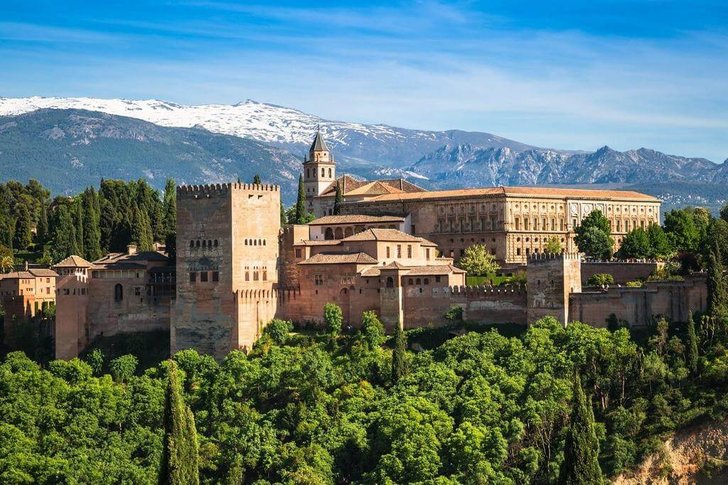
Alcazar of Toledo
The first fortifications on this site were built by the ancient Romans. The fortress repeatedly passed from hand to hand, until in 1486 Pedro I decided to rebuild the castle, and Charles V completed its refurbishment, turning the fortress into a palace. Tourists love to visit the historical monument. Walking along the thick walls of the fortress is allowed. Within the walls of the Alcazar there is a Military Museum and a large library.
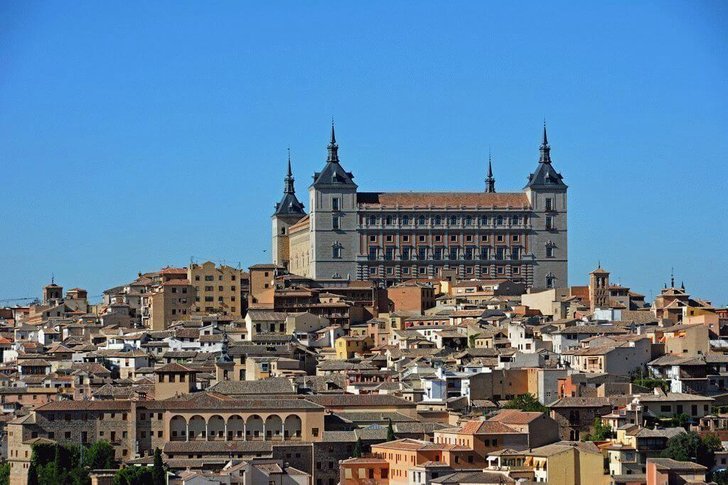
Burgos Cathedral
Cathedral of Catalonia. Built in the Gothic style. Catalan graceful motifs are given to it by an elaborate rosette above the main entrance, turrets looking to the sky and columns. It was founded in 1221, but for 200 years the construction of the cathedral was not carried out. It ended only in 1567. It is an architectural monument and is included in the UNESCO heritage list. There is a lush garden in the courtyard of the cathedral.
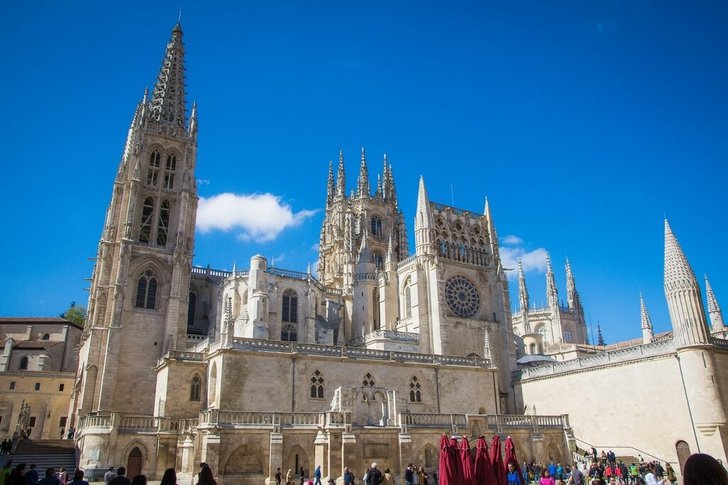
Seville Cathedral
One of the largest cathedrals in Europe in the Gothic style. The length is 116 meters and the width is 76 meters. Its construction was completed in the 16th century. It is believed that it houses the burial place of Christopher Columbus, and the cathedral cross is cast from gold, which the navigator brought from America. Among the many treasures of the cathedral there are paintings by great painters - Goya, Velazquez, Murillo. The cathedral is famous for its organ concerts.
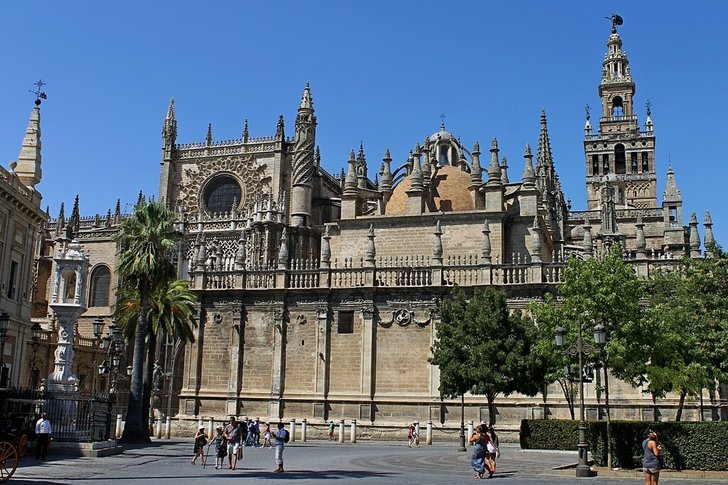
Mesquita (Cordoba)
In the past it was a mosque - the most magnificent in the city. Thousands of tourists travel to Cordoba to see the masterpiece of architecture with their own eyes. Giant double arches inside the building, connected by hundreds of columns. For the manufacture of columns used marble, onyx, granite, jasper. The blue dome is decorated with golden tiles in the form of stars. The prayer hall consists of five zones, each with its own architectural features.
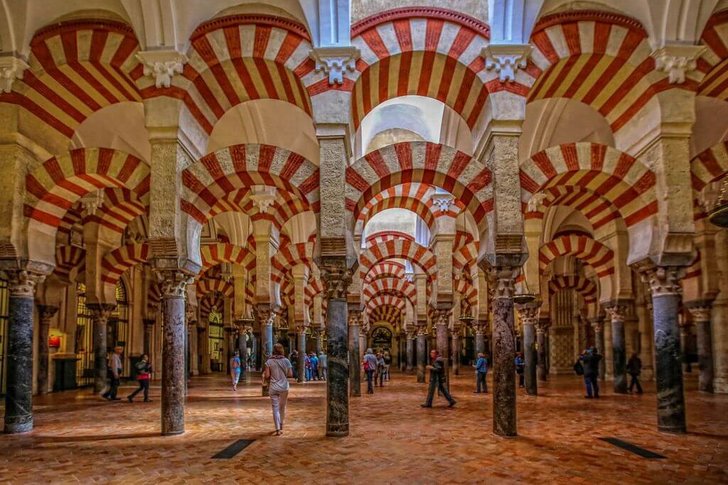
Escorial Monastery
Built in the 16th century by King Philip II. Construction lasted over 20 years. The result was an architectural complex in the Renaissance style, consisting of churches, a palace and cozy courtyards. The monastery has museums that tell about the history of Escorial and keep a collection of works by artists of the 15th-17th centuries. Members of the royal family of Spain are buried in the pantheon at the church.
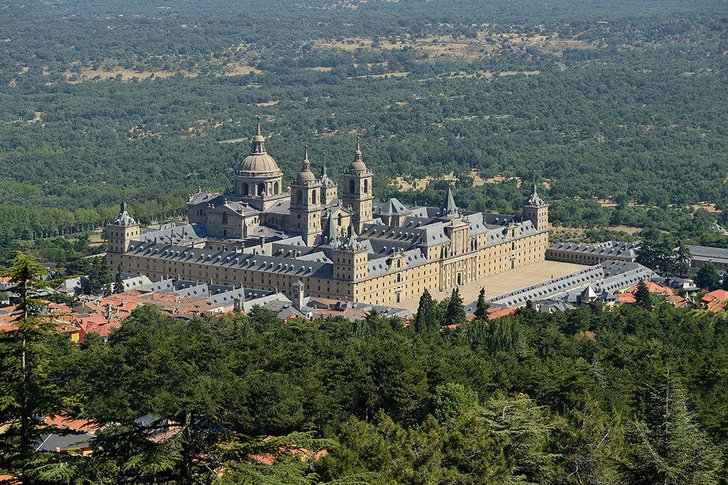
Nuestra Senora del Pilar (Zaragoza)
In translation, the name of the cathedral means the Cathedral of the Virgin Pilar. It is an ancient basilica built in the Baroque style. The first Christian chapel was built on this site in the 2nd century BC, the domes of the modern church were completed in 1961. The church has 11 domes in total. In the center of the church there is a jasper column topped with a 15th-century statue of Mary. The dome frescoes were made in the 18th century. Several vaults were painted by the great Goya.
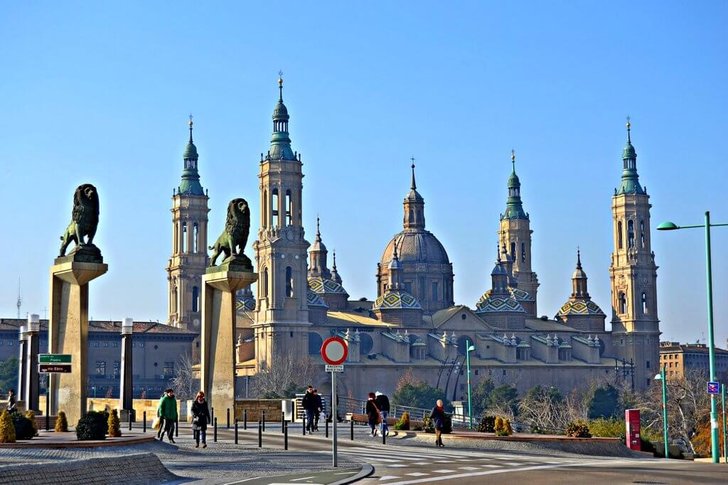
Cathedral of Saint James (Santiago de Compostela)
The relics of the holy Apostle James are buried in the cathedral in the north of the country. Considered one of the great shrines of Spain. Another shrine is a thorn thorn from the crown of Jesus. The construction of the cathedral began in 1211, and it took another 400 years to build. The cathedral does not have a single architectural style, but an imposing baroque façade stands out. Inside is one of the largest censers in the world - the size of a man and weighing 80 kg.
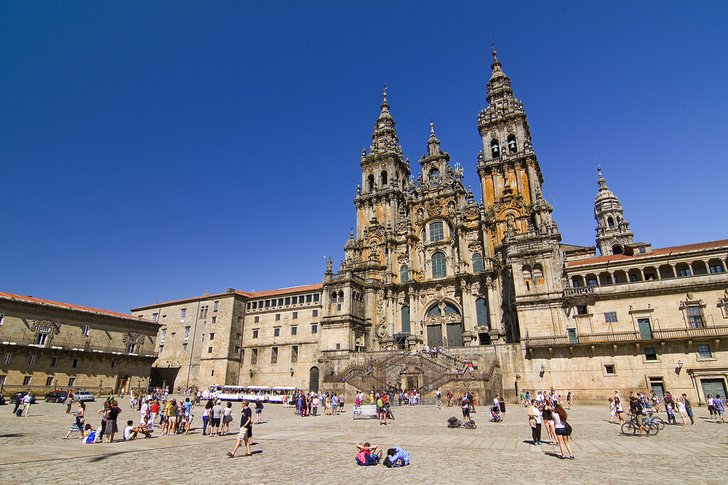
City of Cuenca
A small beautiful city, the historical center of which is included in the UNESCO list. It is located on a rocky picturesque cliff above the gorge. Old houses from the side seem to be growing out of the rocks, they are called "hanging houses". The atmosphere of antiquity is created by architectural monuments - a Gothic cathedral, monasteries and churches, an episcopal palace, many museums. In September, the feast of St. Mateo takes place here, which is celebrated by the whole city.
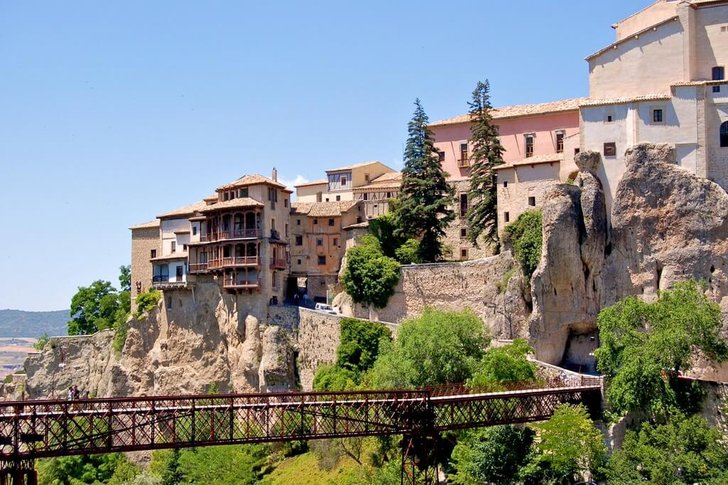
Aqueduct in Segovia
Ground section of the ancient Roman aqueduct. The exact date of foundation is not known, but most scholars tend to believe that it was built in the 1st century. Included in the UNESCO heritage list. Its length is 728 meters, height above the ground is 28 meters. A structure was erected from granite blocks, not fastened to each other in any way. It is a stone bridge with many arched spans.
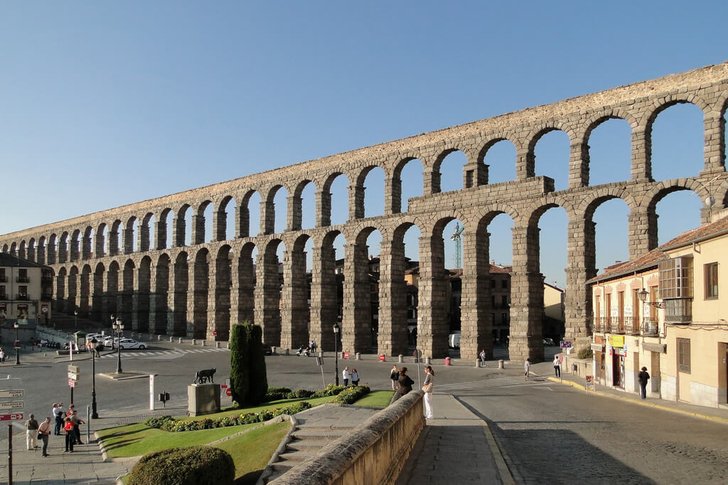
Roman theater (Merida)
Theater of ancient times, built before our era. Included in the architectural ensemble of the city of Merida, which is a UNESCO heritage site. Several fragments have survived to this day, many tourists come to see them. The theater is designed as a semicircular amphitheater, part of the seats are located on the hillside. The Festival of Classical Theater takes place on the stage of the theater every year.
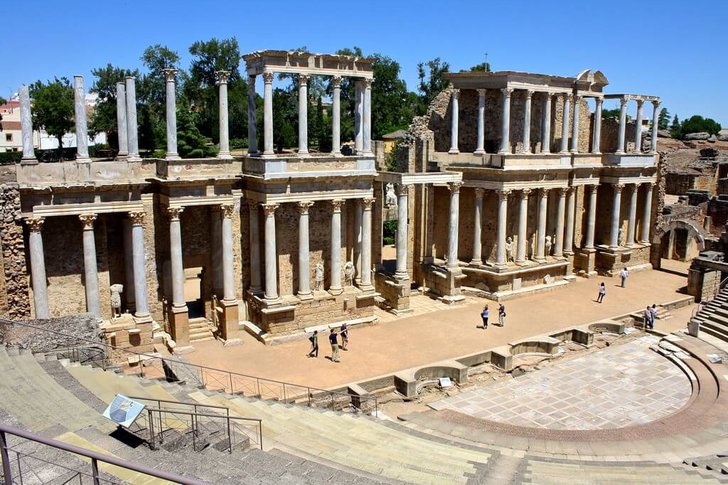
Tower of Hercules (A Coruña)
An ancient Roman lighthouse located on a cliff over 50 meters high in A Coruña. The height of the tower itself is 55 meters. The lighthouse is a UNESCO protected site. Approximately built in the 2nd century and still in use. The walls of the tower are made of granite and are 2 meters thick. The name was received in honor of one of the labors of Hercules. According to legend, Hercules himself built the tower after defeating the giant Geryon.
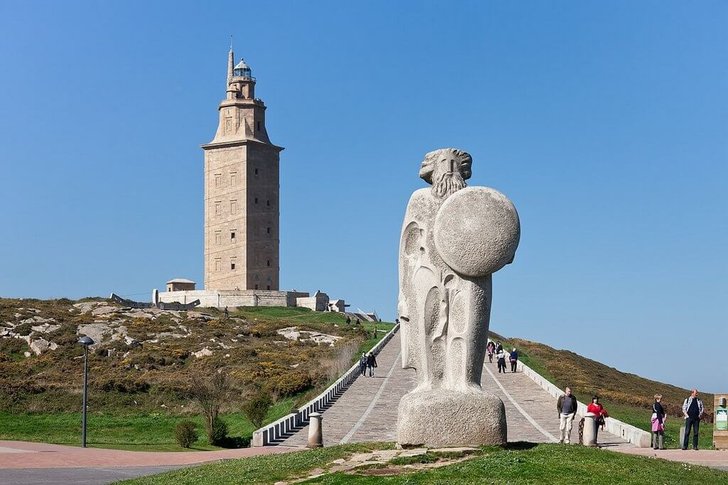
Biscay Bridge (Portugalete)
Bridge-transporter, which is called the "flying ferry". Two towers 60 meters high are installed on the banks of the river. A gondola moves along the central span between them. It fits up to 6 cars and several dozen people. The gondola leaves every 8 minutes, and the journey from one coast to the other takes 1.5 minutes. The bridge was built in 1893 and for that time was a great engineering achievement.
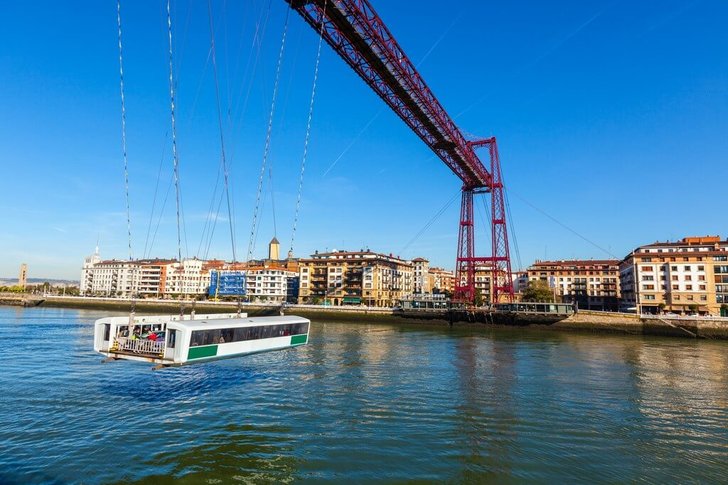
Puente Nuevo (Ronda)
Built in the 18th century across the gorge of the Guadalevín River. The depth of the El Tajo Gorge is 120 meters. The three-arch bridge, 98 meters high, was built of stone. It was built instead of a collapsed single-arch bridge. More than 50 people died in that crash. The observation deck on the bridge is a popular place for tourists. It offers a magnificent view of the river valley and almost the entire city of Ronda - its historical and new part.
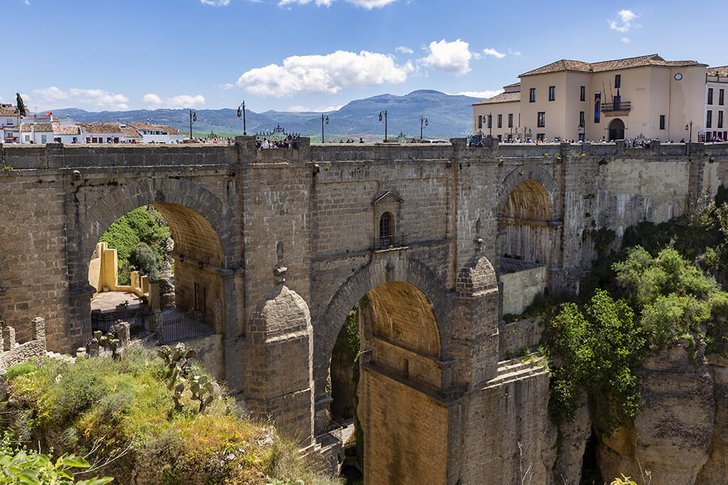
Cave of Altamira
The cave was formed naturally. Its length is 270 meters. The height of the main halls reaches 6 meters. Paleolithic stone paintings have been preserved in the caves - experts in paleontology from all over the world come to explore them. They believe that the cave was used by people about 35,000 years ago. The unique painting of the vaults amazes many scientists. Many call the painting of the cave "the Sistine chapel of primitive art."
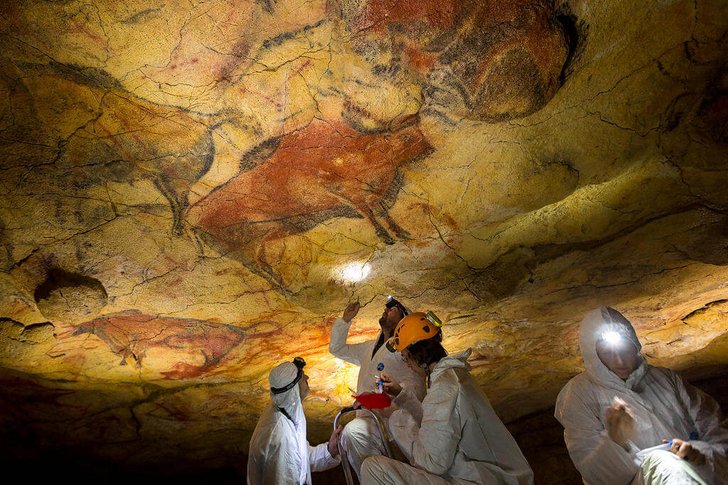
Teide National Park
Located on the popular tourist island of Tenerife. Its territory is located on a volcanic basis. The height of the volcanic formation is 7500 meters. The base of the volcano is at the bottom of the Atlantic Ocean. The highest point of the park is Mount Teide of the same name - 3718 meters. The desert landscape of the park is interesting because of the bizarrely shaped rocks made of hardened lava. A third of the flora of the park grows only in this place.
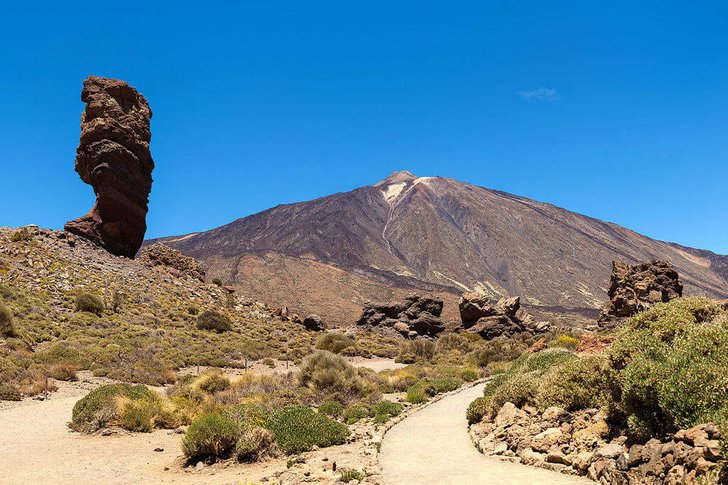
Garajonay National Park
The name is connected with the tragic story of Prince Honai and the girl Gara. The princes' parents were against their wedding, and the lovers took their own lives. The territory of the park is included in the UNESCO heritage list. Most of it is covered with subtropical evergreen forest. Many plant species grow only in this national park. The park is open to visitors and has trails for hikers.
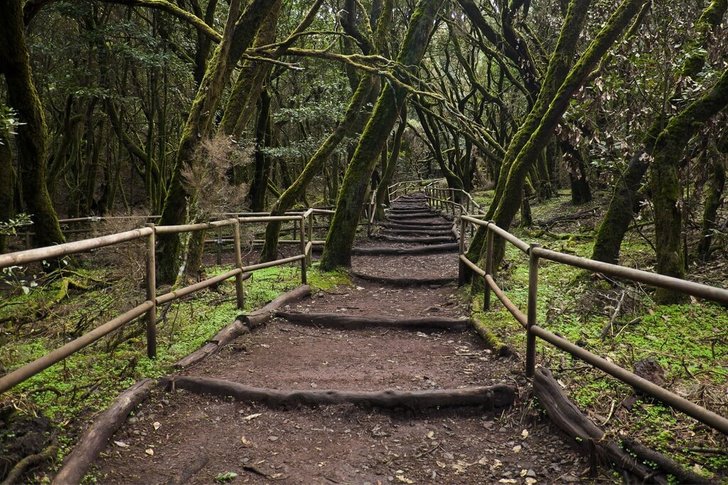
Sierra de Tramontana
Mountain range 90 km long in Mallorca. It stretches from Cape Sa-Mola to Cape Formentor. There are many cultural and ethnic values in this area. The territory of the mountains and historical monuments on them is a UNESCO site. The natural landscape is harmoniously complemented by man-made buildings - stone terraces for growing olives, "snow" houses for storing blocks of snow and ice. Excursions to mountain gorges and peaks are interesting.
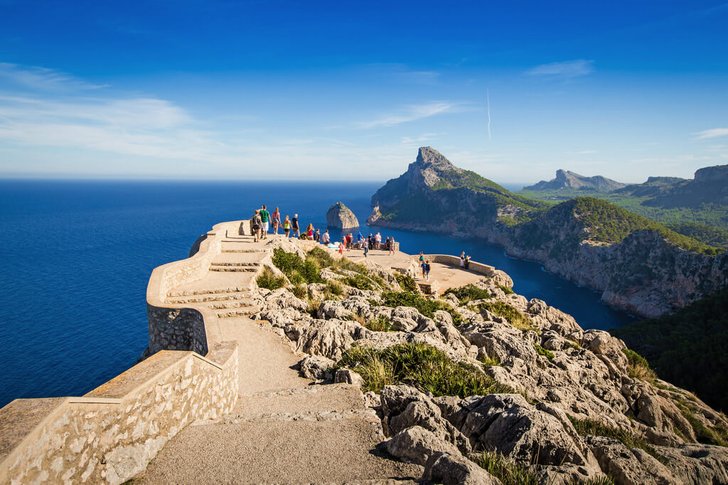
Dunes of Maspalomas
Sand dunes on the ocean. With their appearance, many travelers are reminded of a corner of the Sahara desert. Under the influence of the east wind, the dunes are constantly in motion. The protected area occupies 404 hectares. The park's ecosystem also includes the La Charca sea lagoon. It is separated from the ocean by a sand bar. The flora and fauna of the territory is unique. Some species of insects are found only here or in Africa.
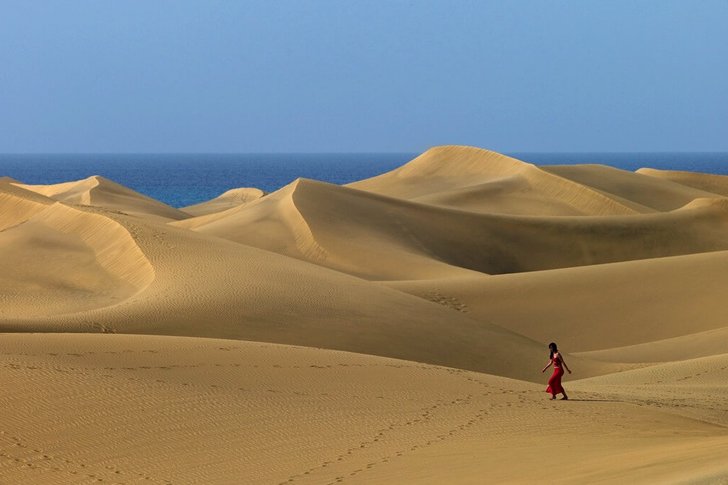
La Concha beach (San Sebastian)
The name of the beach is translated as "shell" - this is the shape of the bay near this beach. The length of the beach is about one and a half kilometers. It consists of sand dunes with golden soft sand. The bay of the beach is protected from the wind. There are practically no waves, so La Concha beach is ideal for families with children. The beach infrastructure is excellent. Not far from the beach area there are interesting sights - palaces and fortresses.
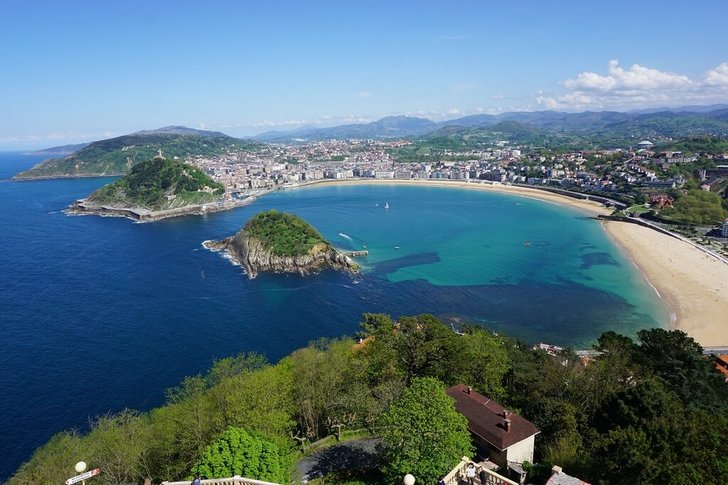
loro park
Zoo located on the island of Tenerife. Since opening in 1972, more than 40 million people have visited it. Popular with an extensive collection of parrots. The number of individuals reaches 4000. Other inhabitants include different types of primates, reptiles, fish and birds. The show of sea lions and killer whales takes place in one of the largest dolphinariums in Europe. An interesting place is the "Thai Village" at the entrance to the park.
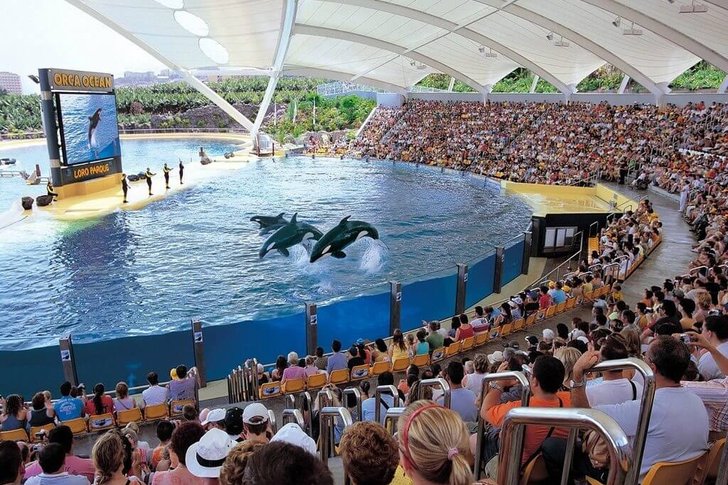
The best places to stay in Spain
Costa Brava
A picturesque natural area on the coast of Catalonia is popular among tourists and local residents. It has many beach resorts and active recreation areas. Popular walks along the gorges and spurs of the Pyrenees among the dense coniferous forest, overlooking the bays and bays. The city has many monuments of ancient culture. In the evening, entertainment parties are held on the beaches.
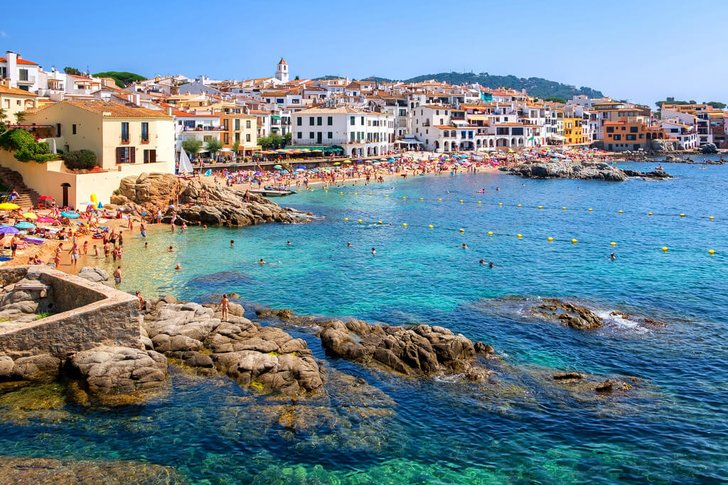
Ibiza island
Known throughout the world for parties and discos, which are attended by thousands of people from all over the world. There are many electronic music clubs open on the island and in the summer they are never empty. In the north, there are secluded resorts, more suitable for relaxing enjoyment of the sea and the sun. There are also historical sights in Ibiza - a castle of the XII century and buildings of the Renaissance.

Canary Islands
The archipelago, beloved by tourists for its mild climate all year round and picturesque nature. 7 islands win the hearts of vacationers with tropical landscapes, deep blue ocean waves and excellent tourist services. Snow-white, golden and even black volcanic - on each island the sand is of a different color. Diving is popular among entertainments - the underwater world near the islands is incredibly interesting.
